Earlier this year Fernando Damas, writer at Sukeban Games, penned a blog post on the studio’s website. He began by saying, “Sukeban Games is not fine.”
The post went up on April Fool’s Day, but it was no joke. Nobody was laughing.
Exactly one year prior, the studio had created VA-11 Hall-A Kids, an irreverent parody of its own cyberpunk bartending visual novel, VA-11 Hall-A. Like gasoline siphoned out of a tank, the will to create an elaborate joke had just drained out of the devs this year.
“We are all broken right now, and trying to pick up the pieces of ourselves so we can keep the dream alive,” the post concluded.
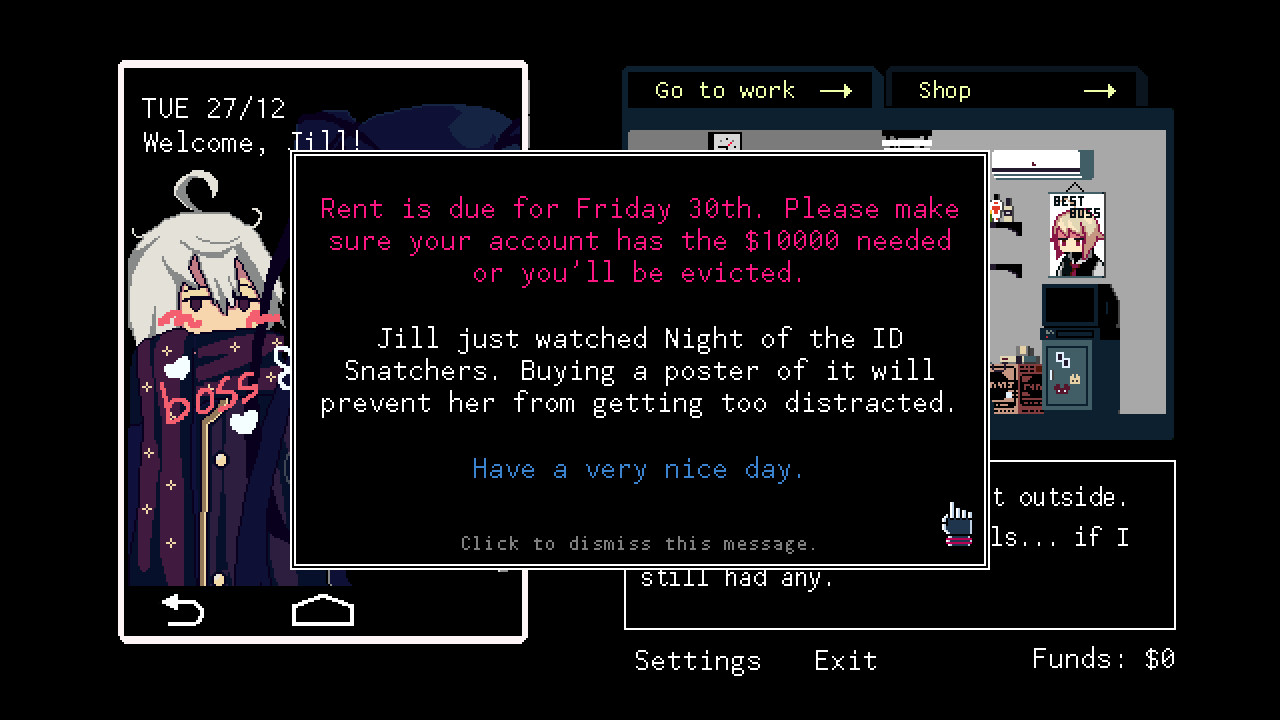
Credit: Ysbyrd Games/AGM Playsim
Tucked away from the bustle of the most heavily trafficked artery of the Washington State Convention Center during PAX was publisher Ysbrid’s booth. That’s where I spoke with a very tired Damas, who had already been at the buzzing show for several days. It was his first time in the United States, and he was demoing a new build for N1RV Ann-A, the upcoming sequel to VA-11 Hall-A.
The majority of the small team of Sukeban Games hails from Venezuela, Damas included. The people of his country, in recent years, have faced hardship after hardship.
The Borgen Project, a non-profit dedicated to combating poverty, characterizes poverty in Venezuela as an epidemic afflicting nearly 90 percent of those residing in the country. There isn’t nearly enough medicine left to go around. Many are starving, with nearly two-thirds of the country going to bed each night with groaning, emaciated stomachs.
It was once a point of pride that through all of the strife they still managed to develop and release VA-11 Hall-A. Now, with N1RV Ann-A in the works, it finally became too much to bear.
“I can deal with myself. I’ve done it many times and I’ll do it in the future. But the problem is when you want to do something and you can’t because the environment you’re in doesn’t let you,” Damas said.
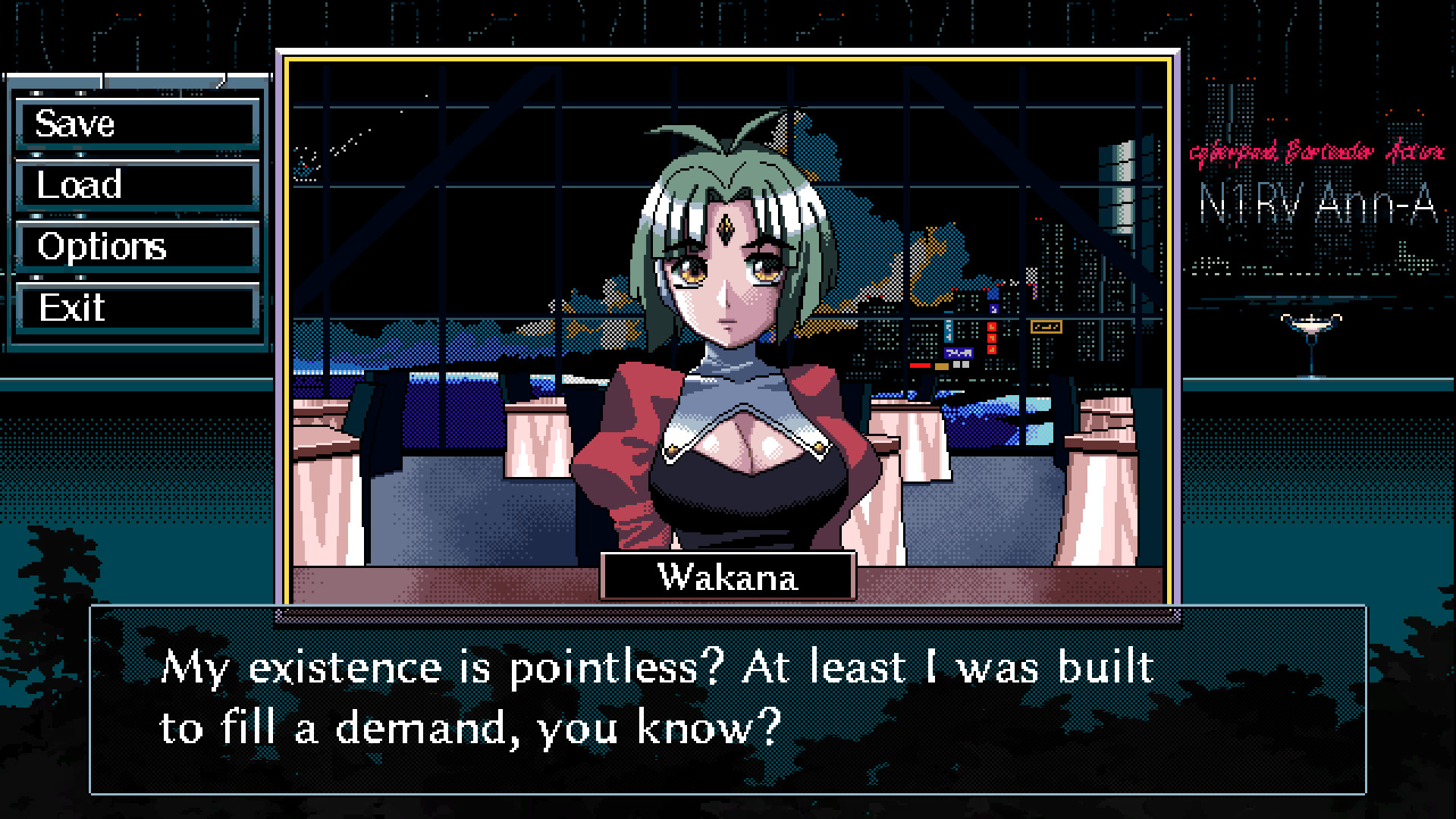
Credit: Ysbyrd Games/AGM Playsim
Thanks to the sales of VA-11 Hall-A, Damas was able to uproot and move to a new home in Japan where he enjoys greater stability—but at a cost. His family and friends are still back in Venezuela. He not only routinely fears for their safety, but struggles with the emotional toll of being physically isolated from them.
The rampant poverty that surrounded him before the move informed the world of VA-11 Hall-A. Patrons often sneer at the austere bowels of the bar, and comment that it stinks inside. There are no windows, just gauche neon signs and the constant feeling that the bar is the relatively calm eye of a churning hurricane of societal unrest outside. Jill, the bartender, uses strange-sounding chemicals like Adelhyde and Karmotrine—implied to be bottom-shelf synthetic ingredients—to mix bootleg cocktails.
On the other hand, N1RV Ann-A’s decor is lavish. The new bar’s interior is spacious. The silhouette of the city’s skyline cuts a beautiful figure against the night sky outside the floor-to-ceiling windows. The bar is stocked with real spirits and ingredients which allow you, as the bartender, to mix real drinks like mojitos and hurricanes instead of knockoffs made with pale imitations of real alcohol.
The bar is classier, and some of the clientele in Saint Alicia seem to have more cash to flash than those of Glitch City. Yet it’s just a different side of the same coin. It’s a class-conscious narrative that still seeks to explore the divide between the wealthy and the impoverished, but from a different angle.
“In cyberpunk everyone talks about the gap between the rich and the poor, right? So everyone talks about the rich, but they’re just weird monolithic entities,” he said.
Tessier-Ashpool S.A. of Neuromancer. The Tyrell Corporation of Blade Runner. Shinra of Final Fantasy VII. Malevolent mega-corporations exist all throughout science fiction and cyberpunk. It suits the purposes of these works to have faceless vanguards of capitalist excess engendering systems of suffocating exploitation and perpetual inequality.
“The thing is, those mega corps aren’t making money out of thin air. They have people working for them,” Damas said. “They might not agree with [the mega corps] but that’s what they do. They work. Not everyone’s a rebel. Some people are just trying to make a living.”
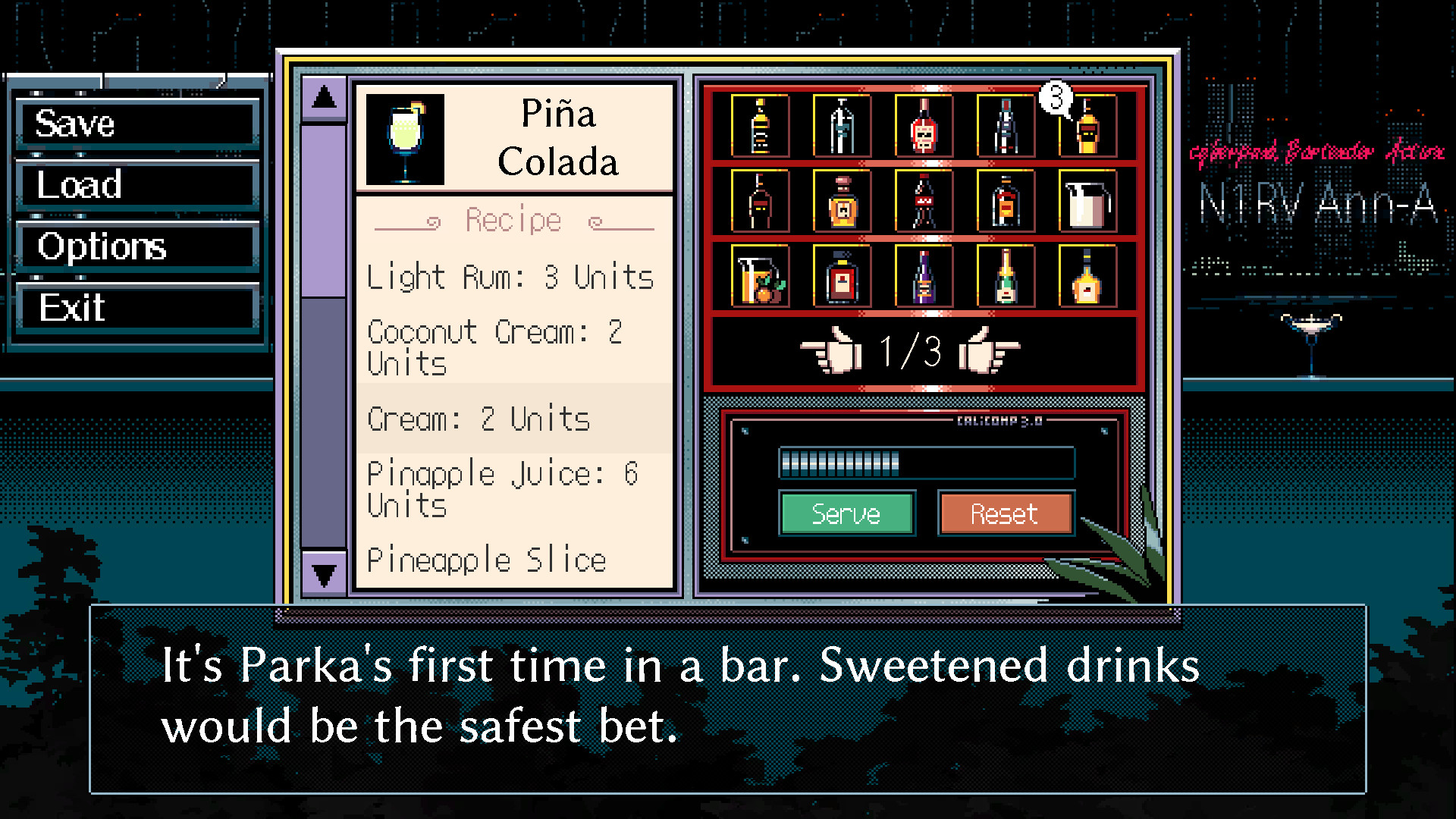
Credit: Ysbyrd Games/AGM Playsim
The demo for N1RV Ann-A Sukeban exhibited at PAX West featured Olivia, an employee at a biotech corporation. She isn’t a grunt there, but she isn’t on the board of executives either. She’s firmly a middle-management type forced to ruthlessly compete against her peers for whiffs of upward mobility. She’s a reminder that that nobody on the corporate ladder short of those at the very top are safe from being exploited, and that even the most smotheringly large corporations are full of people just trying to make ends meet.
Very few of the circumstances that made VA-11 Hall-A‘s development a challenge were within Sukeban’s control, and the problems they could solve directly when work started on N1RV Ann-A were relatively minor. Still, they patched up holes as leaks sprung in the boat up even if they didn’t have the power to turn back the typhoon outside.
VA-11 Hall-A was Damas’ first proper programming experience. As a result he went from knowing nothing about programming to having to know everything. By the time VA-11 Hall-A was out and work began on its sequel, something had to change. For example, the first game required each line of text to have a manual line break. This is not unlike writing on a typewriter and having to pull the carriage return to start each new line.
“A smart person would have made a parser. Something that goes after this many characters I’m going to break here. I didn’t do that,” he said. “That’s just the smallest example of how bullshit VA-11 Hall-A was to work on,” he said, putting extra emphasis on the expletive.
This is also why translating the game into other languages is a herculean effort. Even going back to fix mistakes was an unmitigated nightmare. A great deal of time was invested into not repeating the same mistake twice with N1RV Ann-A. “I spent, like, a year on this,” Damas said, “and no one will notice, but I will!”
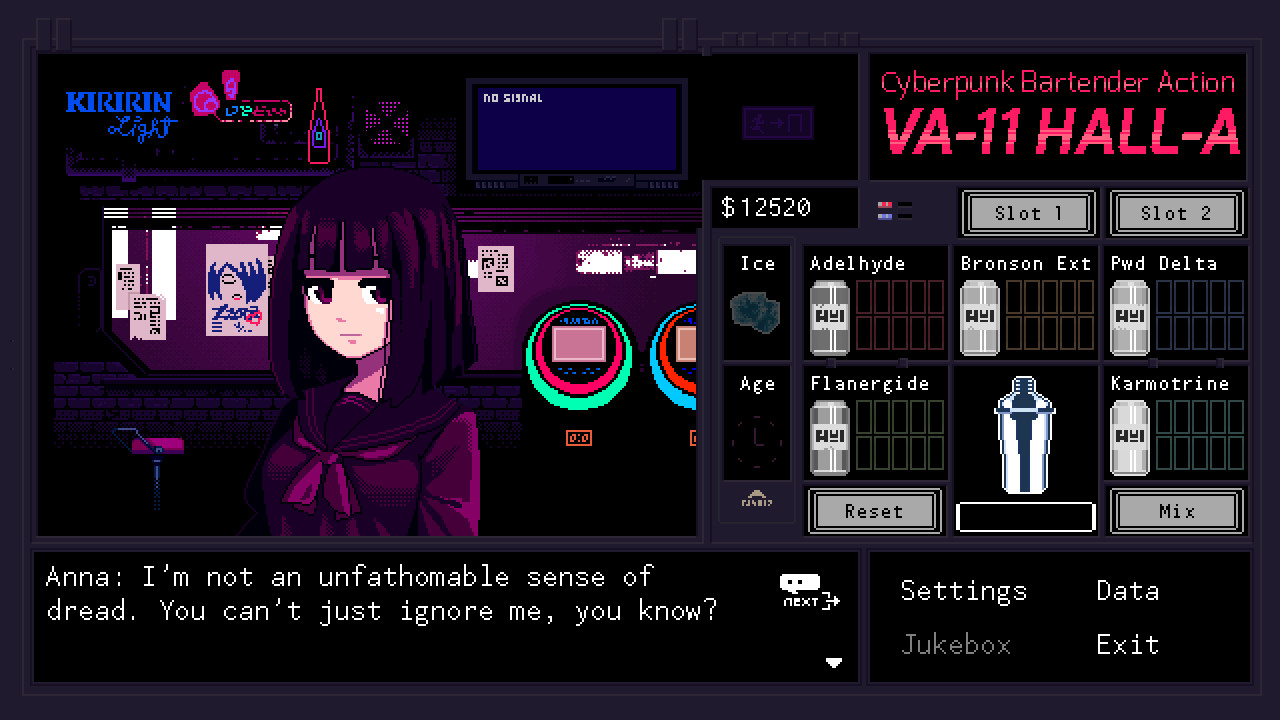
Credit: Ysbyrd Games/AGM Playsim
Unfortunately, backend issues were the least of Sukeban’s woes.
Electricity was rarely a continuously available commodity during the development of VA-11 HALL-A. Damas recounted a story about his mother, a hairdresser, who was forced to mold her shop’s schedule around city-wide blackouts.
Sometimes power outages were announced in advance. Others would unpredictably plunge everyone into an abyssal darkness. When they were predictable, Damas and the rest of Sukeban could at least schedule a time to work on the game. When outages happened randomly, it was chaos for the team. Adaptation was all anyone could strive for in the short-term. Extreme poverty and frequent blackouts became facts of life as routine as sunrise and sunset.
This year has seen the blackouts grow worse as they sweep across the nation, according to a report by the BBC. Hunger and dwindling medical supplies have also become a concern, contributing to an exodus of millions of Venezuelans.
The pungent cocktail of poverty along with starving bellies and sick citizens compounded to seed desperation throughout those who stayed behind. And where there is desperation, there is crime. As with the power outages, violence became just another facet of daily living.
According to a 2019 crime and safety report from the Overseas Security Advisory Council, Venezuela is one of the deadliest countries in the world. The OSAC estimates that there are 81.4 homicides per 100,000 residents—one of the highest rates in the world. Over 23,000 murders took place in the country last year. For comparison, the FBI’s 2018 crime report estimates 16,214 murders took place last year in the United States, a country of over 300 million people. Venezuela’s population is roughly a tenth of that.
“Sadly, you get used to it. Venezuelans, we have a particular quality where we’re really adaptable. But that adaptability also turns into complacency. You adapt so well to the thing that you don’t try to fix it. You just work around it,” Damas said. “It’s a commendable thing, but for the wrong reason.”
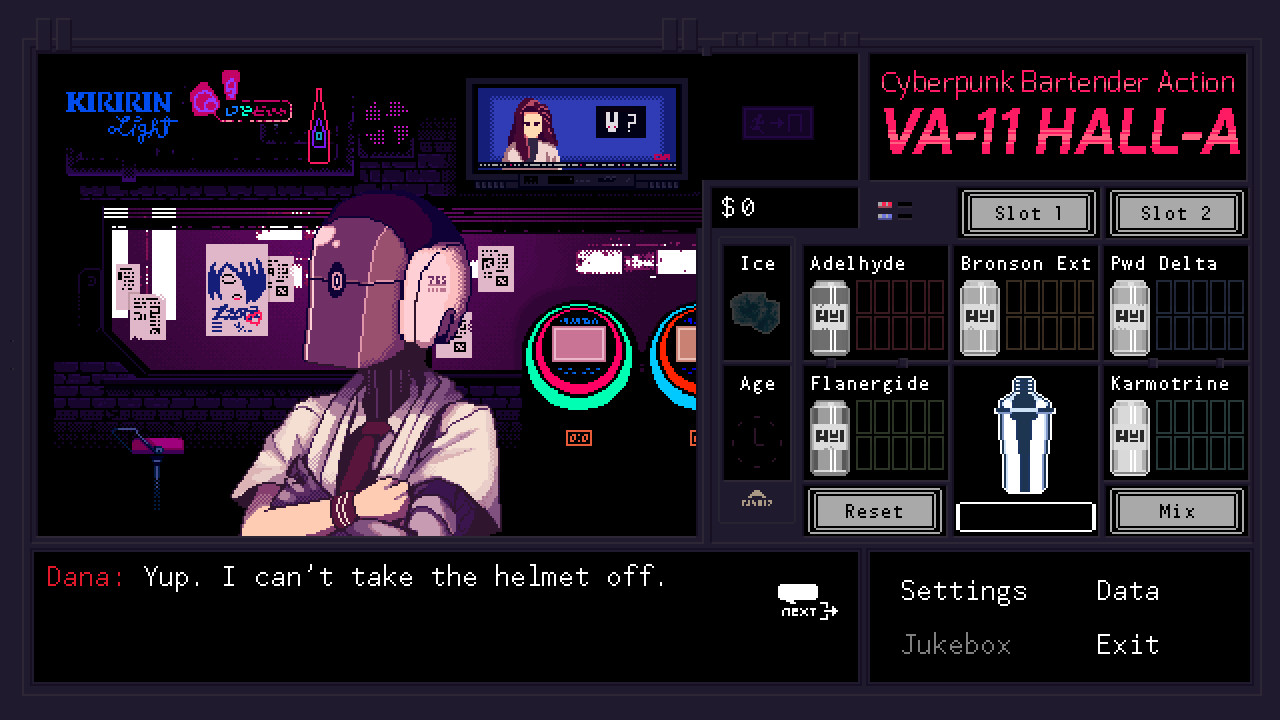
Credit: Ysbyrd Games/AGM Playsim
In a blog post from 2017, the team disclosed that VA-11 Hall-A had sold over 150,000 copies. Money poured in, and with it came the promise of upward mobility. For a team largely based in a nation blanketed by economic uncertainty like atomic fallout, it was beyond anything they could have imagined. Even success can be fraught, however.
They had to keep hush-hush about VA-11 Hall-A’s success. Kidnapping is a major concern according to the previously mentioned OSAC report, as well Damas himself. If the wrong people catch wind of your newfound success, that makes you a potential target to be ransomed.
Sukeban tried to not flaunt its success, especially given that some of the game’s themes might be interpreted as political dissent, but word still managed to slip out. “That, in the end, did nothing. We kept a low profile and we still got in a lot of trouble,” he said. He elected not to elaborate on the nature of the trouble due to ongoing safety concerns.
With increased scrutiny came an increased threat of violence and of kidnapping. That is, in part, why Damas was forced to flee his home country, leaving friends and family behind. “Right now, I’m talking to you and measuring everything I say just because I don’t want that sort… We still have family there. Because they’re my family and they can be traced back to me, they could get in trouble for something I say.”
Despite the upheaval, the unimaginable stress, the heartbreak of seeing his home in a downward spiral, and having to leave it behind, he said that he will not compromise his art. If anything, it is more vital now than ever for him to speak truth to power through his work.
“I want us to be remembered as the guys who didn’t give a fuck.”

David O’Keefe is a freelance journalist and photographer who smiles at the very mention of leopard geckos or Warcraft 3. He studied journalism at The College of New Jersey in his home city of Trenton and was taught photography by the Pulitzer-winning John Filo. As a result of his struggles with depression and social anxiety disorder, David has also become a vocal mental health advocate. He covers games, esports, tech, and entertainment. Follow him on Twitter @DaveScribbles and peruse his portfolio on Muck Rack.